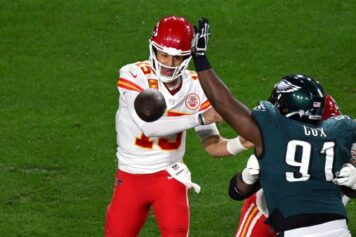The 1963 NCAA national title contest between Loyola-Chicago and two-time defending champs Cincinnati was much bigger than basketball.
It represented something more important and crucial to the soul of America.
Game of Change
undefined
That importance was exemplified in an earlier tournament game in the Mideast Regional semifinals at Jenison Field House in East Lansing, Michigan, when the Ramblers beat Mississippi State, 61-51, in a contest that later came to be known as the “Game of Change.”
The all-white Bulldogs defied its racist governer Ross Barnett, who banned them from crossing state lines to play against the integrated Ramblers. Because the Mississippi State legislature would not allow the team to play against black players, the coach, Babe McCarthy, took the team out of the state on a bus in the middle of the night before a court order could be delivered, preventing them from leaving.
About a month after the Loyola-Mississippi State game, Martin Luther King wrote one of his more widely read documents, The Letter From Birmingham Jail, saying that “Injustice anywhere is a threat to justice everywhere,” imploring people to understand that they have a moral responsibility to break unjust laws and to take direct action rather than waiting in vain for justice to come through court rulings.
Sports has always been a harbinger of change in America, reflective of the larger societal values and ills. And 1963 was a powder keg of racial divides, animosity, violence and subtle shifts in the narrative around hate and this country’s insidious disease of racism.
American Freedom Stories: Medgar Evers – Legacy
In 1954, Medgar Evers became the first state field secretary of the NAACP in Mississippi. As a civil rights leader, he fought to end the racial injustice he experienced growing up in the South.
Loyola’s team back then had broken the unwritten covenant that an integrated squad could only play one Black player on the road, have two on the court at the same time at home and three if they were trailing by a significant margin.
Their coach, George Ireland, tossed aside that antiquated nonsense by starting his team’s best players regardless of race, which meant they trotted out a starting lineup of four and sometimes five Black men.
That was unimaginable at that time, sending shock waves throughout the sports and larger societal landscape.
It brought pride to one faction of the divided nation: those hoping and fighting for progress. The Klan and segregationists had a more sadistic, evil response.
The 1966 Texas Western team gets props for their “Glory Road” national championship win against Adolph Rupp’s all-white Kentucky Wildcats, but it was the Loyola-Chicago crew in 1963 that laboriously paved that road and irrevocably changed the landscape of college basketball forever.
For some perspective, this was a time when the Civil Rights movement was at perhaps its bloodiest. For those entrenched or educated about the struggle, 1963 still conjures up pain and imagery that shocks the sensibilities of what is righteous.
On January 14th, in his inaugural address as the Governor of Alabama, George Wallace infamously and zealously declared with every ounce of intensity that he could muster, that he was getting down for the crown on a platform of “segregation now, segregation tomorrow, segregation forever!”
Medgar Evers was gunned down in the driveway of his home in Mississippi on June 12th, just hours after President John F. Kennedy’s nationally televised Civil Rights Address. On Sunday, September 15th, white supremacist terrorists bombed the 16th Street Baptist Church, killing four little girls in an act that Martin Luther King described as, “one of the most vicious and tragic crimes ever perpetrated against humanity.”
American Freedom Stories: Bombing of the 16th Street Baptist Church
On September 15, 1963, a bomb exploded at the 16th Street Baptist Church as church members prepared for Sunday services. The racially motivated attack killed four young girls and shocked the nation.
The “Freedom Day” Chicago Public Schools Boycott took place on October 22nd. Despite the historic 1954 Supreme Court ruling in Brown v. Board of Education that prohibited school segregation, Chicago’s school segregationist policies were still, under cloak and dagger like many of the country’s public school systems, in full effect in 1963. More than 200,000 students said, “Hell to the naw!“, refusing to go to school while protesters marched on the city’s Board of Education offices.
And into this mix, stepped the Loyola Ramblers.
The death threats began coming, with letters sent to the players at their dorms, after they smoked Tennessee Tech in the first round of the ’63 NCAA Tournament, 111-42.
The Ramblers were a symbol of equality that brought out the worst in those who championed white superiority. Jerry Harkness, one of Loyola’s star players and a senior captain, received hate-filled, hand-written notes promising a violent end to his life. The players walked around fearful, knowing that it wasn’t hard for their most ardent detractors to find them where they slept and ate.
Fans hurled racial taunts and objects at them in those NCAA Tournament venues. They were turned away from restaurants and treated like second-class citizens.
Despite the ominous clouds that accompanied them, they persisted. After knocking off Mississippi State, they beat Illinois, 79-64, in the regional final and proceeded to knock off Duke, 94-75, in the Final Four.
The national championship against Cincinnati featured seven African-American men standing at the tip-off circle. It was the first time the title game featured a majority of Black starters. And it ended in memorable fashion as well, as the Ramblers climbed out of a 15-point deficit in the second half to win 60-58 in overtime on Vic Rouses tip-in.
Their national championship 55 years ago sent an alarm that Black men in America were coming for their recognition and acceptance.
So as we celebrate this year’s Loyola-Chicago squad and Sister Jean for being the feel-good story of the 2018 Final Four, let’s never forget what the 1963 team did.
Game Rewind: Watch Loyola Chicago advance to their first Final Four since 1963 in 9 minutes
Loyola Chicago is headed to their first Final Four since 1963! Watch how the Ramblers took down Kansas State in the Elite 8 in 9 minutes. Watch highlights, game recaps, and much more from the 2018 NCAA Division I Men’s Basketball Tournament on the official NCAA March Madness YouTube channel.
The 2018 Ramblers are no joke with an offense predicated on the extra pass that makes 50% of their shots. They’ve had a different player get busy in each of their four tournament victories and they can drive opponents insane with a delicious five-guard lineup where each player is a threat from deep. They are a marvel of precision passing, defensive intelligence and egalitarian offense.
In a college hoops landscape currently defined by scandal, this 32-5 team from the Missouri Valley Conference came along at the right time to remind us that the game is still in some good hands, regardless of the nonsense that the FBI is trying to feed you.
50th Anniversary of “The Game of Change”
A spotlight of the Michigan State alumni game in Jenison Field House celebrating the 50th Anniversary of the Game of Change — and the first time a basketball game has been held at Jenison since 1989.
And 55 years ago, they came along to remind us all of a much bigger purpose. It’s a fight, outside the lines, that still goes on today.



